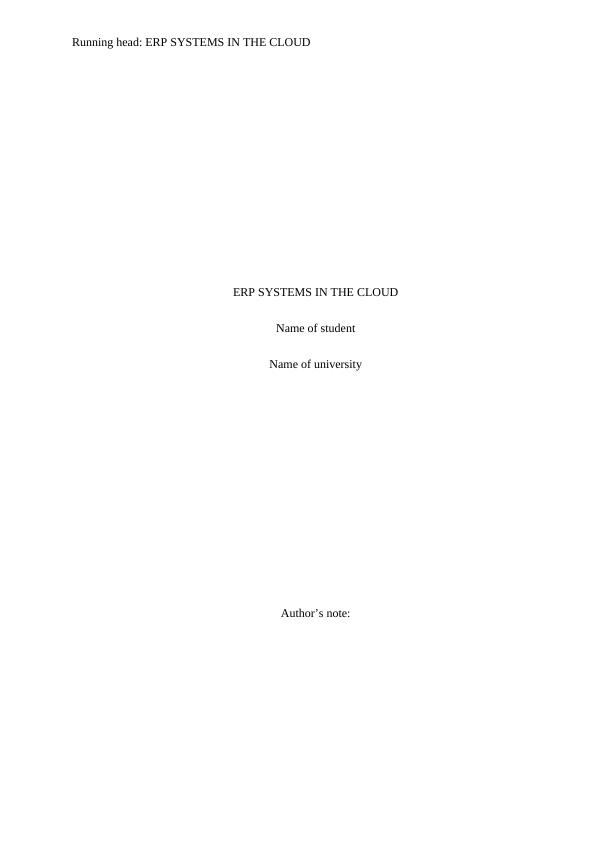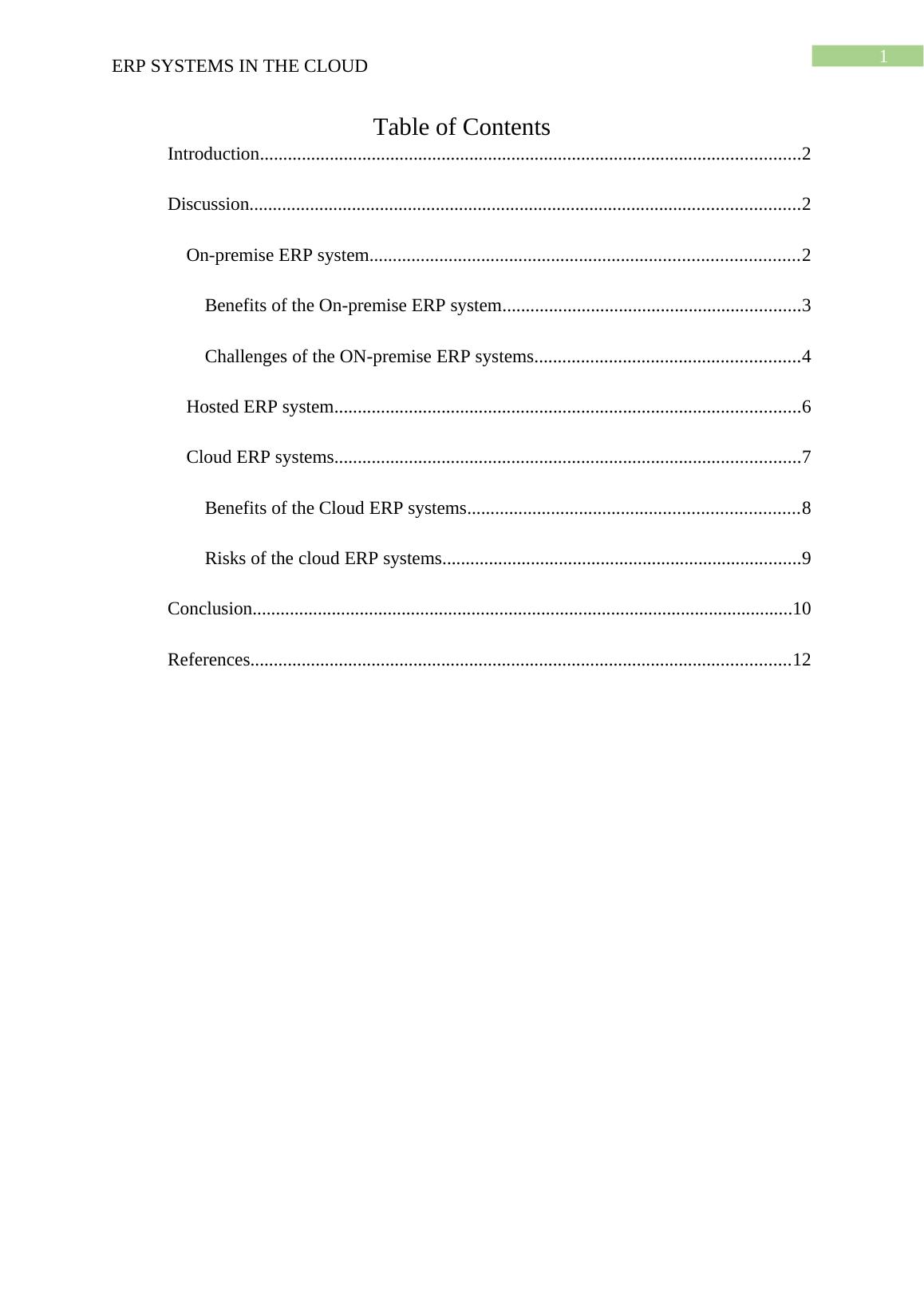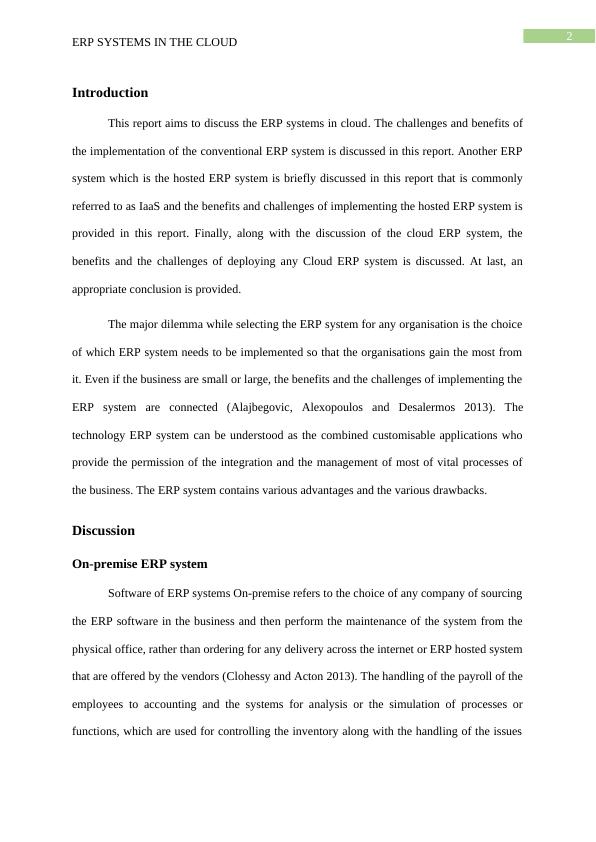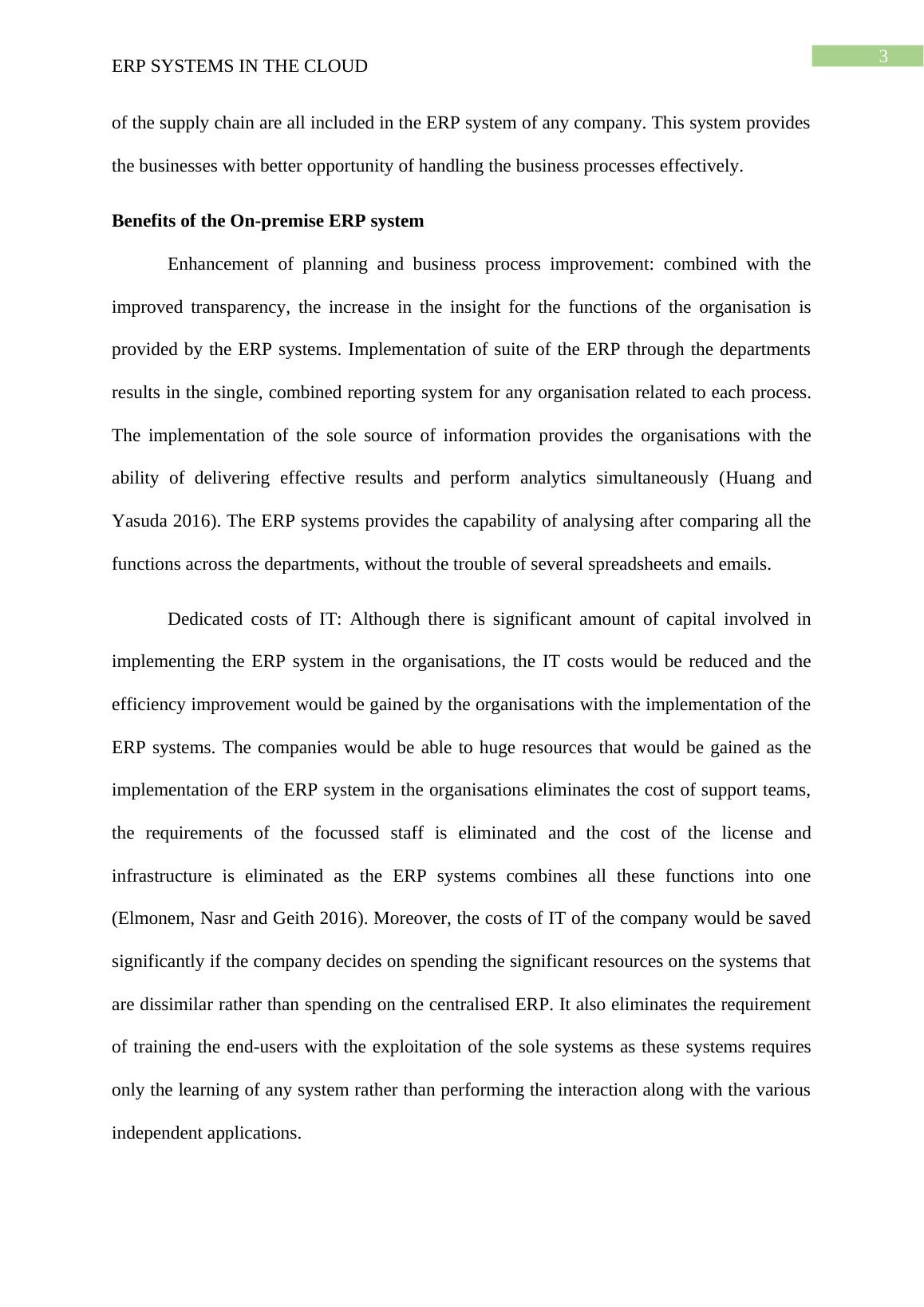ERP Systems in the Cloud
Added on 2023-04-21
17 Pages4238 Words239 Views
Running head: ERP SYSTEMS IN THE CLOUD
ERP SYSTEMS IN THE CLOUD
Name of student
Name of university
Author’s note:
ERP SYSTEMS IN THE CLOUD
Name of student
Name of university
Author’s note:

1
ERP SYSTEMS IN THE CLOUD
Table of Contents
Introduction....................................................................................................................2
Discussion......................................................................................................................2
On-premise ERP system............................................................................................2
Benefits of the On-premise ERP system................................................................3
Challenges of the ON-premise ERP systems.........................................................4
Hosted ERP system....................................................................................................6
Cloud ERP systems....................................................................................................7
Benefits of the Cloud ERP systems.......................................................................8
Risks of the cloud ERP systems.............................................................................9
Conclusion....................................................................................................................10
References....................................................................................................................12
ERP SYSTEMS IN THE CLOUD
Table of Contents
Introduction....................................................................................................................2
Discussion......................................................................................................................2
On-premise ERP system............................................................................................2
Benefits of the On-premise ERP system................................................................3
Challenges of the ON-premise ERP systems.........................................................4
Hosted ERP system....................................................................................................6
Cloud ERP systems....................................................................................................7
Benefits of the Cloud ERP systems.......................................................................8
Risks of the cloud ERP systems.............................................................................9
Conclusion....................................................................................................................10
References....................................................................................................................12

2
ERP SYSTEMS IN THE CLOUD
Introduction
This report aims to discuss the ERP systems in cloud. The challenges and benefits of
the implementation of the conventional ERP system is discussed in this report. Another ERP
system which is the hosted ERP system is briefly discussed in this report that is commonly
referred to as IaaS and the benefits and challenges of implementing the hosted ERP system is
provided in this report. Finally, along with the discussion of the cloud ERP system, the
benefits and the challenges of deploying any Cloud ERP system is discussed. At last, an
appropriate conclusion is provided.
The major dilemma while selecting the ERP system for any organisation is the choice
of which ERP system needs to be implemented so that the organisations gain the most from
it. Even if the business are small or large, the benefits and the challenges of implementing the
ERP system are connected (Alajbegovic, Alexopoulos and Desalermos 2013). The
technology ERP system can be understood as the combined customisable applications who
provide the permission of the integration and the management of most of vital processes of
the business. The ERP system contains various advantages and the various drawbacks.
Discussion
On-premise ERP system
Software of ERP systems On-premise refers to the choice of any company of sourcing
the ERP software in the business and then perform the maintenance of the system from the
physical office, rather than ordering for any delivery across the internet or ERP hosted system
that are offered by the vendors (Clohessy and Acton 2013). The handling of the payroll of the
employees to accounting and the systems for analysis or the simulation of processes or
functions, which are used for controlling the inventory along with the handling of the issues
ERP SYSTEMS IN THE CLOUD
Introduction
This report aims to discuss the ERP systems in cloud. The challenges and benefits of
the implementation of the conventional ERP system is discussed in this report. Another ERP
system which is the hosted ERP system is briefly discussed in this report that is commonly
referred to as IaaS and the benefits and challenges of implementing the hosted ERP system is
provided in this report. Finally, along with the discussion of the cloud ERP system, the
benefits and the challenges of deploying any Cloud ERP system is discussed. At last, an
appropriate conclusion is provided.
The major dilemma while selecting the ERP system for any organisation is the choice
of which ERP system needs to be implemented so that the organisations gain the most from
it. Even if the business are small or large, the benefits and the challenges of implementing the
ERP system are connected (Alajbegovic, Alexopoulos and Desalermos 2013). The
technology ERP system can be understood as the combined customisable applications who
provide the permission of the integration and the management of most of vital processes of
the business. The ERP system contains various advantages and the various drawbacks.
Discussion
On-premise ERP system
Software of ERP systems On-premise refers to the choice of any company of sourcing
the ERP software in the business and then perform the maintenance of the system from the
physical office, rather than ordering for any delivery across the internet or ERP hosted system
that are offered by the vendors (Clohessy and Acton 2013). The handling of the payroll of the
employees to accounting and the systems for analysis or the simulation of processes or
functions, which are used for controlling the inventory along with the handling of the issues

3
ERP SYSTEMS IN THE CLOUD
of the supply chain are all included in the ERP system of any company. This system provides
the businesses with better opportunity of handling the business processes effectively.
Benefits of the On-premise ERP system
Enhancement of planning and business process improvement: combined with the
improved transparency, the increase in the insight for the functions of the organisation is
provided by the ERP systems. Implementation of suite of the ERP through the departments
results in the single, combined reporting system for any organisation related to each process.
The implementation of the sole source of information provides the organisations with the
ability of delivering effective results and perform analytics simultaneously (Huang and
Yasuda 2016). The ERP systems provides the capability of analysing after comparing all the
functions across the departments, without the trouble of several spreadsheets and emails.
Dedicated costs of IT: Although there is significant amount of capital involved in
implementing the ERP system in the organisations, the IT costs would be reduced and the
efficiency improvement would be gained by the organisations with the implementation of the
ERP systems. The companies would be able to huge resources that would be gained as the
implementation of the ERP system in the organisations eliminates the cost of support teams,
the requirements of the focussed staff is eliminated and the cost of the license and
infrastructure is eliminated as the ERP systems combines all these functions into one
(Elmonem, Nasr and Geith 2016). Moreover, the costs of IT of the company would be saved
significantly if the company decides on spending the significant resources on the systems that
are dissimilar rather than spending on the centralised ERP. It also eliminates the requirement
of training the end-users with the exploitation of the sole systems as these systems requires
only the learning of any system rather than performing the interaction along with the various
independent applications.
ERP SYSTEMS IN THE CLOUD
of the supply chain are all included in the ERP system of any company. This system provides
the businesses with better opportunity of handling the business processes effectively.
Benefits of the On-premise ERP system
Enhancement of planning and business process improvement: combined with the
improved transparency, the increase in the insight for the functions of the organisation is
provided by the ERP systems. Implementation of suite of the ERP through the departments
results in the single, combined reporting system for any organisation related to each process.
The implementation of the sole source of information provides the organisations with the
ability of delivering effective results and perform analytics simultaneously (Huang and
Yasuda 2016). The ERP systems provides the capability of analysing after comparing all the
functions across the departments, without the trouble of several spreadsheets and emails.
Dedicated costs of IT: Although there is significant amount of capital involved in
implementing the ERP system in the organisations, the IT costs would be reduced and the
efficiency improvement would be gained by the organisations with the implementation of the
ERP systems. The companies would be able to huge resources that would be gained as the
implementation of the ERP system in the organisations eliminates the cost of support teams,
the requirements of the focussed staff is eliminated and the cost of the license and
infrastructure is eliminated as the ERP systems combines all these functions into one
(Elmonem, Nasr and Geith 2016). Moreover, the costs of IT of the company would be saved
significantly if the company decides on spending the significant resources on the systems that
are dissimilar rather than spending on the centralised ERP. It also eliminates the requirement
of training the end-users with the exploitation of the sole systems as these systems requires
only the learning of any system rather than performing the interaction along with the various
independent applications.

End of preview
Want to access all the pages? Upload your documents or become a member.
Related Documents
ERP Systems in the Cloudlg...
|18
|5200
|454
ERP Systems in the Cloud: Features, Benefits, Drawbacks, and Case Studieslg...
|13
|3948
|190
Comparison of On-Premise, Hosted and Cloud ERP Systemslg...
|16
|5198
|106
ERP Systems in the Cloud: Advantages and Disadvantageslg...
|12
|3891
|270
Enterprise Resource Planning (ERP) System - PDFlg...
|12
|3809
|181
ERP Systems in the Cloud: On-Premise, Hosted, and Cloud ERP Systemslg...
|17
|5093
|421
